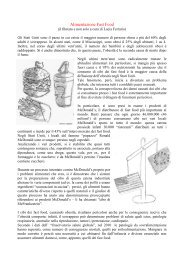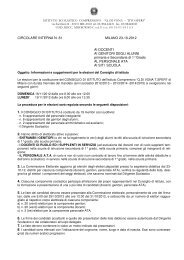- Page 1 and 2:
GWBASIC User's Manual User's Guide
- Page 3 and 4:
GWBASIC User's Manual FILES Command
- Page 5 and 6:
GWBASIC User's Manual PSET Statemen
- Page 7 and 8:
GW-BASIC User's Guide Chapter 1 Wel
- Page 9 and 10:
GW-BASIC User's Guide The Glossary
- Page 11 and 12:
GW-BASIC User's Guide 2.2.2 Indirec
- Page 13 and 14:
GW-BASIC User's Guide Sample GW-BAS
- Page 15 and 16:
GW-BASIC User's Guide system assume
- Page 17 and 18:
GW-BASIC User's Guide Note Reuse of
- Page 19 and 20:
GW-BASIC User's Guide moves the cha
- Page 21 and 22:
GW-BASIC User's Guide CTRL-G Causes
- Page 23 and 24:
GW-BASIC User's Guide BASIC User's
- Page 25 and 26:
GW-BASIC User's Guide Note ↵ (arr
- Page 27 and 28:
GW-BASIC User's Guide Appendix H Ke
- Page 29 and 30:
GW-BASIC User's Guide KEY(n) n is a
- Page 31 and 32:
GW-BASIC User's Guide STRIG Trappin
- Page 33 and 34:
GW-BASIC User's Guide KEY(n) Statem
- Page 35 and 36:
GW-BASIC User's Guide LOC(x) Return
- Page 37 and 38:
GW-BASIC User's Guide 15 KEY OFF:CL
- Page 39 and 40:
GW-BASIC User's Guide and check the
- Page 41 and 42:
GW-BASIC User's Guide Chapter 3 Rev
- Page 43 and 44:
GW-BASIC User's Guide until the RUN
- Page 45 and 46:
GW-BASIC User's Guide To save a fil
- Page 47 and 48:
GW-BASIC User's Guide Hexadecimal H
- Page 49 and 50:
GW-BASIC User's Guide The GW-BASIC
- Page 51 and 52:
GW-BASIC User's Guide The arithmeti
- Page 53 and 54:
GW-BASIC User's Guide Modulus arith
- Page 55 and 56:
GW-BASIC User's Guide EQV X Y X EQV
- Page 57 and 58:
GW-BASIC User's Guide RUN FILENAME
- Page 59 and 60:
GW-BASIC User's Guide OPTION BASE S
- Page 61 and 62:
GW-BASIC User's Guide LET Statement
- Page 63 and 64:
GW-BASIC User's Guide . . 400 R=1:
- Page 65 and 66:
GW-BASIC User's Guide ● Sequentia
- Page 67 and 68:
GW-BASIC User's Guide The program i
- Page 69 and 70:
GW-BASIC User's Guide PUT #1, CODE%
- Page 71 and 72:
GW-BASIC User's Guide number. Lines
- Page 73 and 74:
GW-BASIC User's Guide Appendix A Er
- Page 75 and 76:
GW-BASIC User's Guide 18 Undefined
- Page 77 and 78:
GW-BASIC User's Guide 59-60Unprinta
- Page 79 and 80:
GW-BASIC User's Guide 75 Path/File
- Page 81 and 82:
GW-BASIC User's Guide Appendix C AS
- Page 83 and 84:
GW-BASIC User's Guide Appendix D As
- Page 85 and 86:
GW-BASIC User's Guide moved the cur
- Page 87 and 88:
GW-BASIC User's Guide that the code
- Page 89 and 90:
GW-BASIC User's Guide converted to
- Page 91 and 92:
GW-BASIC User's Guide DEF USR State
- Page 93 and 94:
GW-BASIC User's Guide USR Function
- Page 95 and 96:
GW-BASIC User's Guide E.3 Multiple
- Page 97 and 98:
GW-BASIC User's Guide 8 8 18 24 90
- Page 99 and 100:
GW-BASIC User's Guide _ Underscore.
- Page 101 and 102:
GW-BASIC User's Guide Data represen
- Page 103 and 104:
GW-BASIC User's Guide binary system
- Page 105 and 106:
GW-BASIC User's Guide computers or
- Page 107 and 108:
GW-BASIC User's Guide double-precis
- Page 109 and 110:
GW-BASIC User's Guide graphics A ha
- Page 111 and 112:
GW-BASIC User's Guide precisely ref
- Page 113 and 114:
GW-BASIC User's Guide An extra-bit
- Page 115 and 116:
GW-BASIC User's Guide single-densit
- Page 117 and 118:
GW-BASIC User's Guide ABS Function
- Page 119 and 120:
GW-BASIC User's Guide CHR$ Function
- Page 121 and 122:
GW-BASIC User's Guide AUTO Command
- Page 123 and 124:
GW-BASIC User's Guide BLOAD Command
- Page 125 and 126:
GW-BASIC User's Guide BSAVE Command
- Page 127 and 128:
GW-BASIC User's Guide Note ● Valu
- Page 129 and 130: GW-BASIC User's Guide CDBL Function
- Page 131 and 132: GW-BASIC User's Guide INT Function
- Page 133 and 134: GW-BASIC User's Guide CHAIN Stateme
- Page 135 and 136: GW-BASIC User's Guide MERGE Command
- Page 137 and 138: GW-BASIC User's Guide CIRCLE Statem
- Page 139 and 140: GW-BASIC User's Guide COLOR Stateme
- Page 141 and 142: GW-BASIC User's Guide For more info
- Page 143 and 144: GW-BASIC User's Guide EGA with Enha
- Page 145 and 146: GW-BASIC User's Guide SCREEN 10 ●
- Page 147 and 148: GW-BASIC User's Guide For various s
- Page 149 and 150: GW-BASIC User's Guide PALETTE, PALE
- Page 151 and 152: GW-BASIC User's Guide Enhanced d EG
- Page 153 and 154: GW-BASIC User's Guide N Move, but r
- Page 155 and 156: GW-BASIC User's Guide LINE Statemen
- Page 157 and 158: GW-BASIC User's Guide LINE (0,0)-(1
- Page 159 and 160: GW-BASIC User's Guide tile_length i
- Page 161 and 162: GW-BASIC User's Guide PRESET and PS
- Page 163 and 164: GW-BASIC User's Guide CLEAR Command
- Page 165 and 166: GW-BASIC User's Guide CLOSE Stateme
- Page 167 and 168: GW-BASIC User's Guide COM(n) Statem
- Page 169 and 170: GW-BASIC User's Guide CONT Command
- Page 171 and 172: GW-BASIC User's Guide CSRLIN Variab
- Page 173 and 174: GW-BASIC User's Guide CVI, CVS, CVD
- Page 175 and 176: GW-BASIC User's Guide DATA Statemen
- Page 177 and 178: GW-BASIC User's Guide RESTORE State
- Page 179: GW-BASIC User's Guide the value of
- Page 183 and 184: GW-BASIC User's Guide DEF and SEG m
- Page 185 and 186: GW-BASIC User's Guide POKE Statemen
- Page 187 and 188: GW-BASIC User's Guide EDIT Command
- Page 189 and 190: GW-BASIC User's Guide ENVIRON State
- Page 191 and 192: GW-BASIC User's Guide ENVIRON$ Func
- Page 193 and 194: GW-BASIC User's Guide SHELL Stateme
- Page 195 and 196: GW-BASIC User's Guide EOF Function
- Page 197 and 198: GW-BASIC User's Guide ERDEV and ERD
- Page 199 and 200: GW-BASIC User's Guide ERROR Stateme
- Page 201 and 202: GW-BASIC User's Guide EXP Function
- Page 203 and 204: GW-BASIC User's Guide FIELD Stateme
- Page 205 and 206: GW-BASIC User's Guide GET Statement
- Page 207 and 208: GW-BASIC User's Guide FOR ... NEXT
- Page 209 and 210: GW-BASIC User's Guide FRE Function
- Page 211 and 212: GW-BASIC User's Guide The number of
- Page 213 and 214: GW-BASIC User's Guide GOTO Statemen
- Page 215 and 216: GW-BASIC User's Guide OCT$ Function
- Page 217 and 218: GW-BASIC User's Guide Testing Equal
- Page 219 and 220: GW-BASIC User's Guide 1070 TIMEOUT%
- Page 221 and 222: GW-BASIC User's Guide INPUT Stateme
- Page 223 and 224: GW-BASIC User's Guide PRINT Stateme
- Page 225 and 226: GW-BASIC User's Guide STRING$ Funct
- Page 227 and 228: GW-BASIC User's Guide PRINT USING S
- Page 229 and 230: GW-BASIC User's Guide ** A double a
- Page 231 and 232:
GW-BASIC User's Guide WIDTH Stateme
- Page 233 and 234:
GW-BASIC User's Guide INPUT# Statem
- Page 235 and 236:
GW-BASIC User's Guide 100 PRINT "TY
- Page 237 and 238:
GW-BASIC User's Guide IOCTL Stateme
- Page 239 and 240:
GW-BASIC User's Guide KILL Command
- Page 241 and 242:
GW-BASIC User's Guide MID$ Function
- Page 243 and 244:
GW-BASIC User's Guide LEN FUNCTION
- Page 245 and 246:
GW-BASIC User's Guide LINE INPUT# S
- Page 247 and 248:
GW-BASIC User's Guide LLIST Command
- Page 249 and 250:
GW-BASIC User's Guide LOC Function
- Page 251 and 252:
GW-BASIC User's Guide Makes the cur
- Page 253 and 254:
GW-BASIC User's Guide It is expecte
- Page 255 and 256:
GW-BASIC User's Guide LOG Function
- Page 257 and 258:
GW-BASIC User's Guide MID$ Statemen
- Page 259 and 260:
GW-BASIC User's Guide NAME Command
- Page 261 and 262:
GW-BASIC User's Guide ON ERROR GOTO
- Page 263 and 264:
GW-BASIC User's Guide ON ... GOSUB
- Page 265 and 266:
GW-BASIC User's Guide reclen is an
- Page 267 and 268:
GW-BASIC User's Guide ● Files may
- Page 269 and 270:
GW-BASIC User's Guide RESET Command
- Page 271 and 272:
GW-BASIC User's Guide Examples: The
- Page 273 and 274:
GW-BASIC User's Guide when using GE
- Page 275 and 276:
GW-BASIC User's Guide PCOPY Command
- Page 277 and 278:
GW-BASIC User's Guide n = 5 Returns
- Page 279 and 280:
GW-BASIC User's Guide . (period) A
- Page 281 and 282:
GW-BASIC User's Guide PMAP Function
- Page 283 and 284:
GW-BASIC User's Guide The following
- Page 285 and 286:
GW-BASIC User's Guide If the string
- Page 287 and 288:
GW-BASIC User's Guide PUT Statement
- Page 289 and 290:
GW-BASIC User's Guide RANDOMIZE Sta
- Page 291 and 292:
GW-BASIC User's Guide RND Function
- Page 293 and 294:
GW-BASIC User's Guide . . . 129 FOR
- Page 295 and 296:
GW-BASIC User's Guide RESUME Statem
- Page 297 and 298:
GW-BASIC User's Guide RMDIR Command
- Page 299 and 300:
GW-BASIC User's Guide SAVE Command
- Page 301 and 302:
GW-BASIC User's Guide SGN Function
- Page 303 and 304:
GW-BASIC User's Guide SOUND Stateme
- Page 305 and 306:
GW-BASIC User's Guide SPACE$ Functi
- Page 307 and 308:
GW-BASIC User's Guide SQR Function
- Page 309 and 310:
GW-BASIC User's Guide STOP Statemen
- Page 311 and 312:
GW-BASIC User's Guide VAL Function
- Page 313 and 314:
GW-BASIC User's Guide STRIG(n) Stat
- Page 315 and 316:
GW-BASIC User's Guide SYSTEM Comman
- Page 317 and 318:
GW-BASIC User's Guide TAN Function
- Page 319 and 320:
GW-BASIC User's Guide 08:00:05 The
- Page 321 and 322:
GW-BASIC User's Guide TRON/TROFF Co
- Page 323 and 324:
GW-BASIC User's Guide 0 1 Mode The
- Page 325 and 326:
GW-BASIC User's Guide VARPTR$ Funct
- Page 327 and 328:
GW-BASIC User's Guide The following
- Page 329 and 330:
GW-BASIC User's Guide WAIT Statemen
- Page 331 and 332:
GW-BASIC User's Guide WINDOW Statem
- Page 333 and 334:
GW-BASIC User's Guide WRITE Stateme




